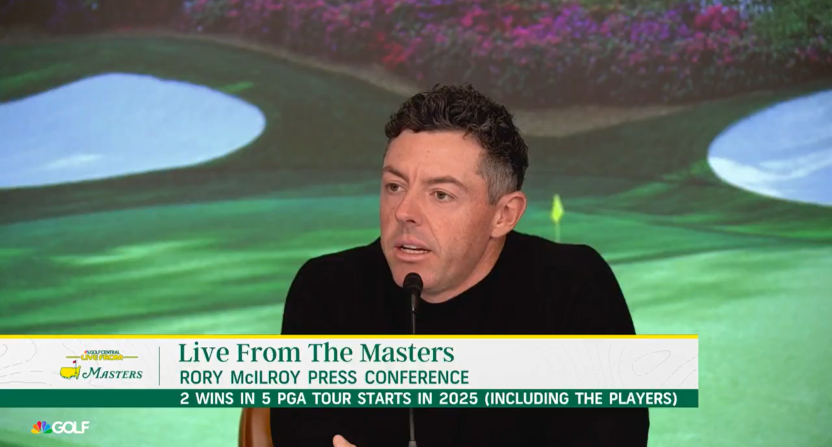As the world of men’s professional golf continues to navigate a new post-LIV world, one topic at the forefront of discussion is the relationship between the players and media. And Rory McIlroy gave a surprising answer on the topic at a Masters press conference.
The emergence of LIV Golf has pushed the PGA Tour forward. And part of that push has been for players to give more access to the media. Some of those efforts have included on-course interviews prior to teeing off and during a round. But other efforts focus on access more generally.
Earlier this year, two-time major winner Justin Thomas authored a letter to PGA Tour membership urging his fellow players to give more access to the press. In turn, Thomas argued that the broadcast would benefit and fans would become more invested in the Tour’s product.
Those talking points reemerged last month when Collin Morikawa, fresh off a heartbreaking loss at the Arnold Palmer Invitational, opted not to speak with the media. In defending his decision, Morikawa said he “doesn’t owe anyone anything,” which sparked accusations of “entitlement” from some within golf media.
Now, as the golf world descends on Augusta, Georgia for this week’s Masters Tournament, one of the faces of the sport is defending Morikawa.
Fielding questions from the press during his Masters media availability on Tuesday, Rory McIlroy addressed the ongoing debate over the media’s access to players.
“Look, every other athlete, whether it be in the NBA, NFL, they’re obligated to speak to you guys after a game. We’re not,” McIlroy said. “Whether that’s something that the PGA Tour looks to in terms of putting that into the rules and regulations, but as long as that’s not the case, and we have that option to opt-out whenever we want, expect guys to do that from time to time.”
Those remarks didn’t exactly sit well with Golf Channel’s Eamon Lynch, who took aim at McIlroy following his comments.
“He’s right as a matter of policy, and I would argue wrong as a matter of principle,” Lynch said. “The players are not obligated in any of the rules and regulations of the PGA Tour to give time to the media afterwards. It’s another argument as to whether they ought to be obligated, or should they feel an obligation, because they are now nominally owners of the PGA Tour, they ought to be their own marketers. They should look at that as customer service, in a way, when you have people that have invested time and money in your product, I think they are entitled to a little bit of something at the end of the narrative of the weekend.
“As much as I’ve criticized Greg Norman and Phil Mickelson over the years, they never walked away in the toughest moments. And both of those guys have plenty of those moments. …People have faced much worse and felt a sense that they can actually share those moments. Golf tournaments aren’t really that important in the grand scheme of things. I do think there’s a sense among this generation of players that it’s more optional than it ought to be,” Lynch concluded.
The relationship between the players and media has certainly become more fraught in recent years. But, as Thomas argued earlier this year, it’s crucial, in this moment, to give a little more than one might be comfortable with.
When players are vulnerable with the media, it’s unusual for the media to pile on. In fact, it’s typically the media’s job to humanize those moments, and ultimately make players look more sympathetic. In the absence of any access, the media is left to speculate about how a player feels or what his motives in skirting the press really were.
It’s difficult to disagree with Rory McIlroy from a technical standpoint. The policy is the policy. But in professional golf’s larger context, McIlroy’s comments are a bit shortsighted.
